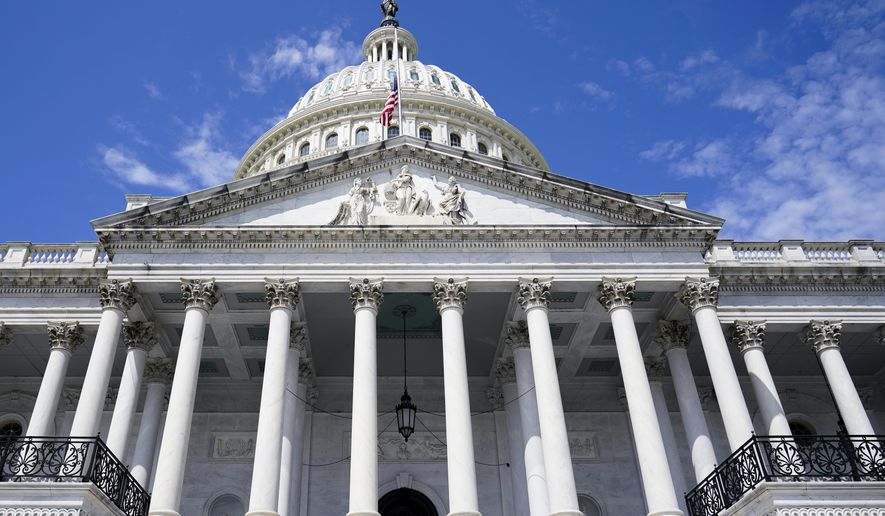Senate Democrats passed the Inflation Reduction Act along party lines on Sunday, pushing through the sprawling $740 billion measure that achieves a scaled-down version of President Biden’s goals on climate, health care and tax hikes.
The vote marks a significant victory for Mr. Biden after more than a year of courting his party’s wary moderates.
The bill passed 51-50, with Vice President Kamala Harris casting the tiebreaking vote. The measure circumvented the chamber’s usual 60-vote threshold under rules for budget legislation. It now heads to the House, where final approval is expected this week.
After round-the-clock weekend voting, Senate Majority Leader Charles E. Schumer hailed the legislation as the “boldest climate package in U.S. history.”
“It’s been a long, tough and winding road,” the New York Democrat said. “The Senate is making history. It will kick-start the era of affordable clean energy in America. … It’s a game-changer. It’s a turning point. It’s been a long time coming.”
Republicans, who vehemently opposed the bill because of its massive climate spending and tax provisions, decried the Inflation Reduction Act’s passage as another “reckless taxing and spending spree.” They said it will imperil an economy on the brink of recession and warned that voters will spurn Democrats’ high spending in November.
“Democrats have proven over and over they simply do not care about middle-class families’ priorities. They have spent 18 months proving that. They just spent hundreds of billions of dollars to prove it again,” said Senate Minority Leader Mitch McConnell, Kentucky Republican. “But the working Americans they have failed will be writing Democrats’ report cards in three months’ time.”
Nonpartisan analysts have said the package will have little or no impact on reducing inflation, especially in the short term. Inflation has hit a 41-year high at an annual rate of 9.1%, putting Democrats on the defensive over their multitrillion-dollar spending deals in the past two years.
The bill was passed after a marathon “vote-a-rama” session that lasted through Saturday night into Sunday.
Republicans offered dozens of mostly ill-fated amendments. They opposed the bill’s $370 billion cost to combat climate change over the next decade and its tax increases on large corporations.
Mr. Biden lauded the vote by repeating that the package will tackle inflation via lowering the deficit and everyday costs for families, the opposite of the economic impact Republicans predicted.
“I ran for president promising to make government work for working families again, and that is what this bill does — period,” Mr. Biden said in a statement. “This bill tackles inflation by lowering the deficit and lowering costs for regular families.”
The legislation marked a stunning election-year reversal when Mr. Schumer struck a deal with Sen. Joe Manchin III, even after the centrist West Virginia Democrat said he would not support the one-sided process for passing such a spending bill.
The deal shocked Washington, and Mr. Manchin secured several energy-friendly provisions, including a pledge by Democratic leaders to approve streamlining of federal permits for energy projects by the end of next month. His deal also requires more government auctions for oil drilling on federal land and waters.
To avoid a last-minute collapse with one of their centrist members, Sen. Kyrsten Sinema of Arizona, Democrats agreed to narrow the 15% minimum corporate tax rate on businesses making more than $1 billion.
Despite various hurdles in recent weeks that threatened to derail Democrats’ agreements with Mr. Manchin and Ms. Sinema, the party was ultimately able to stick together by making concessions that would ensure their support.
Democrats estimate that the Inflation Reduction Act will slash climate-changing greenhouse gas emissions by 40% from 2005 levels in the next 10 years. Its clean energy provisions primarily feature tax credits that Democrats say will push consumers and sectors of the economy away from fossil fuels and toward cleaner forms of energy.
The legislation also includes the extension of health insurance subsidies for Obamacare recipients and allows Medicare to negotiate prescription drug prices. The move was expected to save the government money and help pay for the bill. A $35 insulin cap was included for Medicare recipients, but Republicans stripped it from the bill for private insurance carriers.
Democrats plan to pay for the new spending primarily by closing tax loopholes that allow major corporations to pay little or nothing to the federal government, in addition to implementing a 1% stock buyback tax.
The legislation is estimated to reduce the deficit by roughly $300 billion over the next decade. The scaled-back version of Mr. Biden’s original “Build Back Better” proposal, which was estimated to cost roughly $3.5 trillion, discarded proposals such as universal preschool and paid family leave.
Republicans predict that low- and middle-income Americans will be the ones to bear the tax burdens. They said the bill will do nothing to combat inflation, which is at its highest level in 40 years, therefore worsening the economy as the U.S. teeters on the brink of a recession.
• Ramsey Touchberry can be reached at rtouchberry@washingtontimes.com.




Please read our comment policy before commenting.